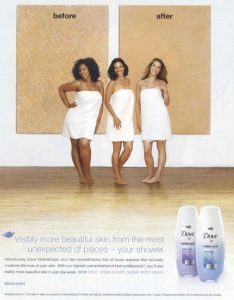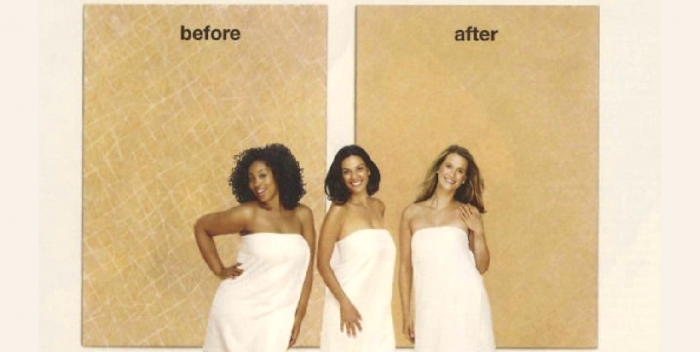It’s not what Dove meant, it’s what people see
| filed under: Frank Luntz, Black Twitter, Crisis Management, Dove Lotion, Racism, Race, Racist, Reputation Management, Online Reputation, DoveDove has historically actively pursued women’s diversity in race, color, size, shape. This is a controversy of context in a world that is not only allowed but empowered to excerpt, crop, edit, and define meaning.
Reputation is what you have and work hard to preserve. Most crises result from foot-in-mouth disease. The road to hell is paved with good intentions. They’re mostly self-inflicted injuries that result from the disease known as, “hey, that’s not what I meant!”
For those of you under a rock, there are a couple Dove ads that were circulating on Facebook, past tense, that are spit-take racially offensive as they are covered and portrayed on Facebook and Twitter.
In one, an African American woman in a brown top undresses to reveal a white woman in a light pink top.
While the ad continues to show the white woman further undressing into an Asian woman, showing Dove’s diversity and how their body lotion is ideal for all types and colors of skin, the image of a black woman skinning down to become a white woman, “cleaning off the black”/”washing off the black” is all anyone came away with and all anyone will remember.
 Here’s the ground zero post on Facebook from Naythemua. She’s recently been interviewed on Good Morning America about the incident.
Here’s the ground zero post on Facebook from Naythemua. She’s recently been interviewed on Good Morning America about the incident.
The damage continued with another ad for Dove lotion, wherein a curvy African American with curly black hair, on the left of the ad, in the “before” box, transitions into a woman of color with wavy brown hair, and then finally into a skinny, straight-haired, blonde standing in the “after” box.
Maybe it was an innocent mistake on Dove’s part. But it’s starting not to feel that way in any year, to say nothing of 2017. It’s not what Dove meant, it’s what people see–and Black Twitter isn’t happy at all.
In college and my twenties I was a poet. I minored in creative writing in undergrad and was always reduced to being spitting mad when my friends would playfully reduce my poetry into being about everything besides my most earnest attempts at pouring my heart out (apparently all of my poetry is simply lightly-veiled psych 101 Freudian code about sex and genitals–and upon a recent reread, it’s true).
For example, back in 2008, Matthew Creamer and I teamed up to write (and Matt actually wrote) Pepsi Opens a Vein of Controversy With New Suicide-Themed Ads with the follow up that I wrote, Pepsi Apologized to Me for Its Suicide Ads.
 This was an example of cross-cultural confusion but that didn’t mean a thing when victims of actual suicide and the people who love them saw the ads on message boards and social media. Official diagnosis: heartless, monstrous, and insensitive to the issue of suicide.
This was an example of cross-cultural confusion but that didn’t mean a thing when victims of actual suicide and the people who love them saw the ads on message boards and social media. Official diagnosis: heartless, monstrous, and insensitive to the issue of suicide.
Creamer wrote, the ads “show a cute but sad little personification of a calorie committing suicide in a few ultraviolent ways, including a gunshot, a hanging, self-immolation and even slitting his little blue wrist with a razor blade.” Apparently the sporty people of Düsseldorf prefer the darkest humor imaginable. Okay, they’re monsters.
The ads for PepsiMax by BBDO Düsseldorf were focus-grouped to a very specific European sports demographic. The expectation was that ads can be not only targeted but contained. That was almost 9-years ago and Dove apparently hasn’t gotten the memo: like poetry, literature, and the Bible, once an ad is published, the author has zero control over how it’s interpreted. Companies need to think about those possible interpretations before the ad is out, and recognize mistakes before it’s time for damage control.
There’s a lot of news about this. Allure, USA Today, US Magazine, NPR, WNEP, and so many others — even Snopes! Here’s a collection of tweets that directly illustrate the sort of conversations happening on Twitter over the last few days, for example, direct from the source:
Okay, Dove... One racist ad makes you suspect. Two racist ads makes you kinda guilty. pic.twitter.com/hAwNCN84h2
— Keith Boykin (@keithboykin) October 8, 2017
An image we recently posted on Facebook missed the mark in representing women of color thoughtfully. We deeply regret the offense it caused.
— Dove (@Dove) October 7, 2017
Dove apologised for 'racist' Facebook advert showing a black woman turning white after using @Dove lotion. pic.twitter.com/NGXyhnGuBZ
— Habeeb Akande (@Habeeb_Akande) October 8, 2017
An image we recently posted on Facebook missed the mark in representing women of color thoughtfully. We deeply regret the offense it caused.
— Dove (@Dove) October 7, 2017
Dove apologised for 'racist' Facebook advert showing a black woman turning white after using @Dove lotion. pic.twitter.com/NGXyhnGuBZ
— Habeeb Akande (@Habeeb_Akande) October 8, 2017

(Via Biznology Business Blog)

